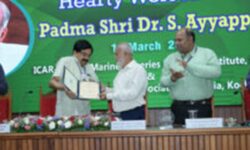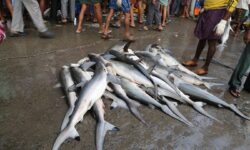Kerala’s Red Rice Contains Key to Improve Crop Productivity: Scientists
THIRUVANANTHAPURAM:
Pokkali, the tasty protein-rich red rice from Kerala is a favourite among both domestic and international researchers who are seeking to improve crop yields in the face of adverse global challenges like salinity, climate change, diseases, drought, climate change, diseases, and pests among others.
Research on the paddy variety endemic to Kerala by Ramanjulu Sunkar, Professor, Oklahoma State University, USA and Neeti Sanan-Mishra, Scientist, at the New Delhi-based International Centre for Genetic Engineering and Biotechnology has indicated novel outcomes which can be used to create “smart plants”, capable of fighting environmental factors such as water salinity, drought and high temperatures that have a negative impact on crop productivity.
The scientists are among over 30 world renowned researchers from nearly 20 countries who are participating in a four-day international conference, the first of its kind in India, jointly organised by Rajiv Gandhi Centre for Biotechnology (RGCB) and European Molecular Biology Organisation, (EMBO).
Ramanjulu, who hails from Andhra Pradesh discovered micro RNAs from rice for t
he first time in 2005. Since then his lab has been working to identify how these micro RNAs are helping salt-tolerant Pokkali rice by comparing with the high-yielding salt-sensitive IR29 genotypes. These comparisons, he said, already identified several leads which he wants to investigate further.
“We have tried to comparatively analyse two varieties of rice – a salt- susceptible tolerant variety like Pokkali and a salt-tolerant variety sensitive of varieties like IR29 and basmati to identify specific molecules that makes Pokkali to be productive even under salinity inhibit growth and productivity, which we are trying to analyse further. We are still at the very early stages of our research but the results are positive and has given us a lot of confidence,” said Neeti.
The uniqueness of Pokkali rice, which has been awarded the GI (geographical indication) tag in2008, and grown in the waterlogged coastal areas of south and central Kerala is highly tolerant to salinity, that is a major threat worldwide to agriculture and particularly rice, which is among the least salt sensitive among cereals.
Unearthing the secret of tolerance to salt among Pokkali, say scientists, can power studies to engineer varieties of other crops that can withstand salinity and thus lead to higher yields. The studies can also propel traditional breeding approaches to create more salt-tolerant high yielding rice varieties.
“Among the most serious environmental problems faced today is salinisation. There is demand to grow more food for a growing population and among the many challenges faced by science and technology is how to increase crop yield in the face of such issues like depleting water resources,and cultivable land,” said Prof Radhakrishnan Pillai, Director, RGCB.
Noted plant physiologist Dr Sudhir Sopory, the former Vice-Chancellor of Jawaharlal NehruUniversity and a Padma Shri recipient has also used Pokkali to understand how it reacts and tolerates external stress factors like salinity, temperature and changes in nutrients.
“In an earlier study comparing two rice varieties we had concluded that faced with adverse circumstances like high salt content in water Pokkali activates certain ‘anti-stress’ detoxifying mechanisms that help it fight and withstand the negative impacts” Sopory said.




